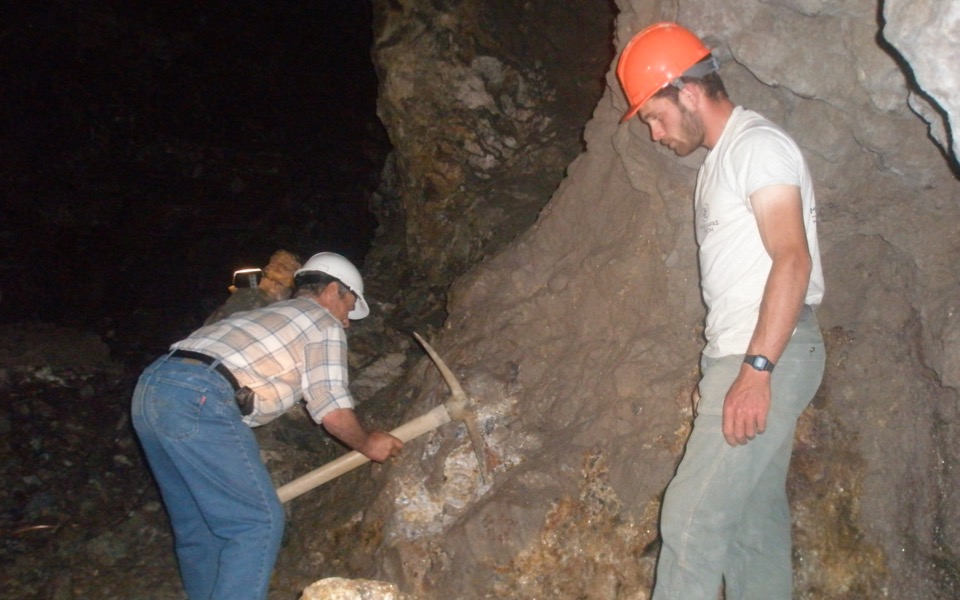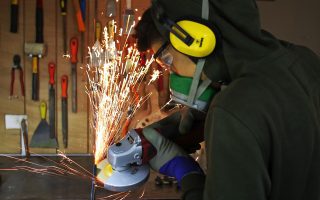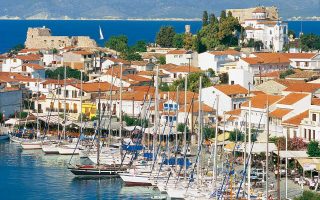The long and arduous tradition of emery mining on Naxos

“Mining is really demanding. Emery miners are forced to inhale dynamite smoke in tunnels as deep as 500 meters beneath the surface. Most miners suffer from silicosis [an occupational lung disease], and, if they live long enough, are affected by arthritic and rheumatic conditions caused by the damp inside the mines,” noted Manolis Manolas, a seasoned miner with more knowledge than most on the mines in the mountains of Naxos.
Manolas grew up in a mining family. Conversations at home have typically revolved around the subject of emery, a dark granular rock comprising corundum, magnetite and other minerals, referred to as “smyrigli” on the island. It is used as an abrasive powder as well as a traction enhancer in asphalt and tarmac mixtures. Manolas knows all about the sector’s history, people, and even Greece’s legal framework concerning emery, which, according to the miner, includes more than 250 laws.
We met up at Koronos, a mountain village which for decades has been the main emery mining center in the region, and from there took the road leading to the mines.
“Emery village locals have an advantage. The mining jobs are reserved for those who live in or hail from these places,” Manolas explained. “Emery is a state monopoly, meaning that every year, the miners have to hand over everything they mine to the Greek state, which then does the selling, as it holds the exclusive trading rights,” he continued. Roughly 8,000 tons of emery is supplied to the Greek state each year.
Approximately 300 people are employed at the emery mines, well under the 3,000 who worked there in the 1940s. This comparison highlights the sector’s weakened standing and drastically reduced benefits provided to workers today. Nowadays, the job essentially ensures social security fund coverage for health and pensions, according to the miners. Many of the island’s miners are based elsewhere and return to Naxos at the end of summer, when mining activity recommences for about three to four months.
Koronos community leader Nikos Houzouris, who has worked in the local emery mines for the last 32 years, told Kathimerini that mining alone no longer suffices to make a living.
“When the mines are closed, most of us switch to other jobs – in construction, farming, or at shops. The mining profession no longer offers prospects,” Houzouris remarked. “The state used to provide tools and dynamite. These days, the miners are forced to pay for this equipment themselves.”
There are a total of six emery mining villages – Koronos, Skado, Mesi, Keramoti, Apiranthos and Danakos – in Naxos’s mountains. In the past, the mining work was enough to support entire households. A total of approximately 250 mines surround these villages.
Yiannis Koufopoulos, now 51, works at one of the mines and will qualify for his pension next year. He lives in Athens, where he is employed in the building sector, but he heads to Naxos every summer and waits for the mining activity to resume.
“I learnt to work at the emery mines from the age of 8, alongside my father. I often skipped school so I could be at the mines. We were a poor family and needed the extra money to get by,” Koufopoulos recalled. “It’s a shame that the profession has been degraded. Generations have offered their lives to the mines. We don’t want to see them go. We want them to continue to exist and provide life to our villages,” he added.
Another miner, Apostolos Koufopoulos, 31, works as an electrician in the island’s main town and heads to the mountains around fall. He says he works the mines for the social security benefits, as well as his devotion to the sector. “I was taught the job working with my grandfather and father. Things were better in the past,” he said, “Our grandfathers shed blood to open up these mines. The state should offer support for development,” he added emphatically.
Every year, the miners face the same anxieties. They struggle to meet the agreed production quota before winter sets in. Workers want the mines to open earlier, in May, so that they have more time to meet the quota under less pressure, while also enabling better social security coverage for the miners, noted Michalis Pasoulas, a local mining union chief.





